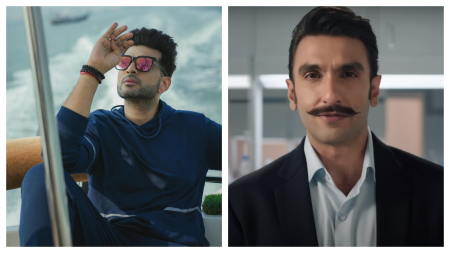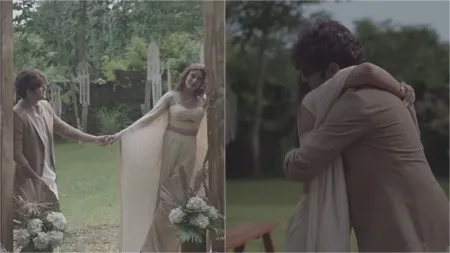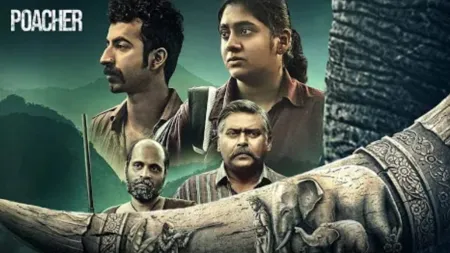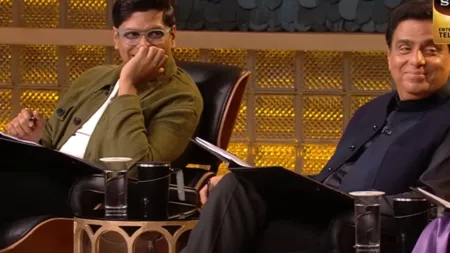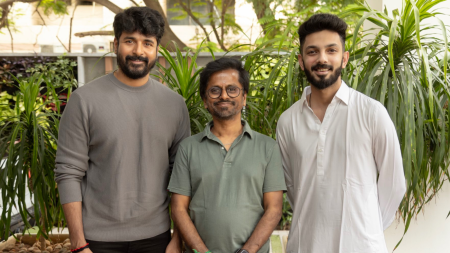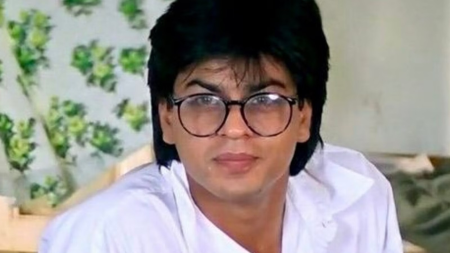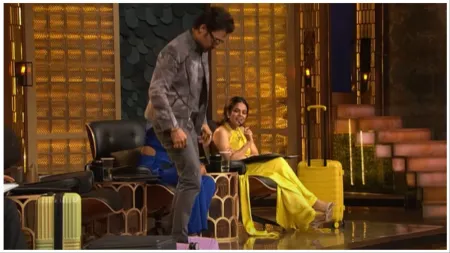“Once you step through the gateway of this mana (a Namboodiri mansion), it itself becomes the river, plains, and mountain,” the servant (Sidharth Bharathan) tells the uninvited guest, Thevan (Arjun Ashokan). Initially, Thevan interprets it as an expression of the mansion’s vastness. However, he soon realises it’s a warning: once inside, there’s no way out.
Bramayugam, Rahul Sadasivan’s third directorial endeavour, unfolds in the said mana, but not a glittering one. Instead, it resembles the ghost of its former opulence, now in ruins. It’s untidy. Nature has reclaimed parts of it, with vegetation creeping up the walls and many roof tiles broken. The structure screams, “visitors not allowed”. Yet for Thevan, who is trying to escape his fate and survive, this mana is the only ray of hope. As he enters, Thevan is “welcomed” by the patriarch of the mana, Kodumon Potty (Mammootty), an elderly man who seems like a shadow of his former affluent self. Upon learning that Thevan hails from the Panan community, who made a living by singing for the Kings, Potty requests a song. Impressed by his singing, Potty insists that Thevan stay, offering the comfort of continuous music. Initially hesitant, Thevan accepts, viewing Potty as a generous man who, despite his lower caste, welcomes him. But once he starts living there, Thevan realises that the mansion hides many secrets, with Potty as the enigmatic guardian. As mentioned earlier, escape is not an option for Thevan. So, what can he do?

Set in South Malabar in the 17th century, Bramayugam delves into mythology to offer a brilliant take on the politics of power and the significant role caste plays. It can be seen as a high-stakes game of dice too. Within the mana, inhabited solely by Potty and the servant, Thevan realises he and the servant are mere pawns on the game board. They think they can influence outcomes through luck to find a way out. But Potty, who has control over the dice, knows how to script “fate”. Akin to the historical struggles of Bahujans who often lacked control over their lives, here too, a Brahmin holds sway over everything, treating others as expendable pawns to be discarded once he loses fun in playing with their lives.
The horizons of the movie are expanded by Rahul’s adept use of mythology, wherein dark magic and the concept of Chaathan come into play, creating a horrifying atmosphere. Believed to be born to Lord Shiva and a Pulaya woman, Chaathan is worshipped to gain unparalleled strength. Here, the Pottys are depicted as the Brahmin family blessed by Goddess Varahi with Chaathan. However, the Pottys exploit Chaathan, leading to severe repercussions. As Chaathan gains control over his destiny, he mirrors his former masters by exploiting others to assert his power. With this, the film brilliantly shows how immense power can blind people. In today’s socio-political context, this theme gains relevance as the historically oppressed groups continue to be exploited by those in positions of authority.
Bramayugam also illustrates how caste plays a major role in power dynamics and how inheritance of power becomes common greed. The servant, later revealed to be a descendant of the Potty family, attempts to dethrone Chaathan to ascend to power, despite Thevan’s attempts to dissuade him, warning that he too will become like Chaathan. However, the servant pays no heed.
Pinpointing Bramayugam’s greatest strength proves challenging due to its multifaceted excellence. But since we need to start somewhere, Rahul Sadasivan’s world-building deserves a standing ovation. With meticulous attention to detail, Rahul has created a far more dreary atmosphere here than in Bhoothakaalam, enabling Bramayugam to be dubbed as Malayalam’s “horror cinema peaked here” moment. Jotish Shankar’s expert art direction and Rahul’s profound understanding of the world he created, which is reminiscent of the sharp ones in A Vincent’s Sreekrishnaparunthu (1984) and Santosh Sivan’s Anandabhadram (2005) though they don’t share similarities per se, ensure an exceptional viewer experience. The decision to present the world in black and white enhances the eerie atmosphere while adding depth to the characters, reflecting their complexities. Noteworthy are the moments of crafted delusion. Unlike conventional Malayalam horror films, Bramayugam exhibits uniqueness by creating elements from scratch, avoiding clichés and traditional tactics, including in the depiction of the Yakshi (female ghost played by Amalda Liz).
Rahul’s writing, combined with TD Ramakrishnan’s dialogues, is exceptionally original and effectively captures the nuances of the world without excessive explanation. However, the film falls short of fully capitalising on its high points, often cutting abruptly at these moments, which may detract from the overall viewing experience. Nevertheless, despite the challenge of featuring only three central characters and two supporting ones, Rahul’s punctilious script and visual finesse compensate for the movie’s minor shortcomings.
Previously, one of his smiles in Bheeshma Parvam (2022) had garnered much praise for its unprecedented sense of monstrosity. For those impressed by that, Bramayugam is sure to leave you breathless as, towards the end, once Mammootty begins emanating absolute evil, he gives one of the most notorious smiles ever seen, completely encapsulating the essence of the character. While he has consistently displayed brilliance in portraying grey characters, with Baskara Pattelar in Vidheyan (1994) and Kuttan in Puzhu (2022) being prime examples, Mammootty surpasses himself in Bramayugam, exuding darkness like never before. Even at this age and stage in his career, he doesn’t hold back in even the most disturbing scenes in the film, going all in and extracting the best from himself to elevate the movie. His sharp and measured dialogue delivery, along with the malevolence he exudes through subtle glances and smirks, further enhances the brilliance of Bramayugam. Thanks to his stellar performance, Potty can certainly join the ranks of characters like Kumaran Thampi (Mohanlal) in Sreekrishnaparunthu and Digambaran (Manoj K Sivan) in Anandabhadram, who are the embodiment of evil.
Arjun Ashokan shines here as Thevan. While his dialogue delivery may seem somewhat subdued and occasionally tedious, his expertly conveyed body language and subtle physical nuances of the character more than compensate for it. Sidharth Bharathan also impresses with his multifaceted performance, skillfully capturing the various dimensions of the character.
Shehnad Jalal’s cinematography is a standout feature of Bramayugam, effectively capturing its depth even without colour. Particularly towards the end, as the characters are affected by delusions and feel the mana moving and/or closing in on them, the shots are crafted with brilliance, evoking a palpable sense of horror. Shafique Mohamed Ali’s editing also helps viewers fully grasp the ethos of the world and its dread. S George’s makeup for Mammootty is commendable and sharp, while Ronex Xavier excels with that for other characters. Jayadevan Chakkadath’s sound design immerses viewers in Bramayugam. Although the film fails to leverage silences properly and occasionally overdoes the background music and sound effects, Christo Xavier’s music is as brilliant as it can be, allowing the spirit of the age of madness to rise from within and sail above audiences.
Bramayugam movie cast: Mammootty, Arjun Ashokan, Sidharth Bharathan, Amalda Liz, Manikandan R Achari
Bramayugam movie director: Rahul Sadasivan
Bramayugam movie rating: 3.5 stars
Disclaimer: The copyright of this article belongs to the original author. Reposting this article is solely for the purpose of information dissemination and does not constitute any investment advice. If there is any infringement, please contact us immediately. We will make corrections or deletions as necessary. Thank you.
